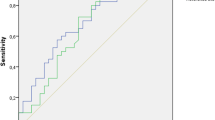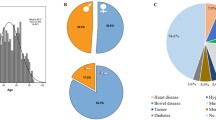Abstract
Objectives
Leptin levels are associated with appetite and energy expenditure in healthy individuals. The present study aims to evaluate serum and salivary leptin concentrations in patients with squamous cell carcinoma of the buccal mucosa.
Materials and methods
Enrolled participants in this study included 41 patients with squamous cell carcinoma of the buccal mucosa and 40 healthy control patients. Serum leptin levels were measured via enzyme-linked immunosorbent assay (ELISA) method in all subjects and reported in units of nanograms per millilitre. Salivary leptin levels were measured by a highly sensitive and specific non-equilibrium version of a dedicated custom radioimmunoassay.
Results
A significant reduction in salivary and serum leptin levels in patients with squamous cell carcinoma of the buccal mucosa was observed in comparison to control subjects. In addition, a significant correlation was shown between serum and salivary leptin levels on one hand and body mass index, with various histopathological and TNM (tumour nodes metastasis) staging variants of squamous cell carcinoma of the buccal mucosa on another. A highly significant correlation was shown between salivary and serum leptin levels in both groups.
Conclusion
The results of this study demonstrate a possible mechanism of salivary and serum leptin levels in squamous cell carcinoma of the buccal mucosa.
Clinical relevance
Salivary leptin might play a role in squamous cell carcinoma of the buccal mucosa.
Similar content being viewed by others
References
Inui A (1999) Cancer anorexia-cachexia syndrome: are neuropeptides the key? Cancer Res 59:4493–44501
Bruera E (1977) Anorexia, cachexia and nutrition. Br Med J 315:1219–1222
Billingsley KG, Alexander HR (1996) The pathophysiology of cachexia in advanced cancer and AIDS. In: Bruera E, Higginson I (eds) Cachexia-anorexia in cancer patients. Oxford University Press, Oxford, pp 1–22
Friedman JM, Halaas JL (1998) Leptin and the regulation of body weight in mammals. Nature 395:763–770
Elmquist JK, Maratos-Flier E, Saper CB et al (1998) Unraveling the central nervous system pathways underlying responses to leptin. Nat Neurosci 1:445–450
Inui A (1999) Feeding and body-weight regulation by hypothalamic neuropeptides-mediation of the actions of leptin. Trends Neurosci 22:62–67
Schwartz MW, Seeley RJ (1997) Neuroendocrine responses to starvation and weight loss. N Engl J Med 336:1802–1811
Moldawer LL, Copeland EM (1997) Proinflammatory cytokines, nutritional support, and the cachexia syndrome: interactions and therapeutic options. Cancer 79:1828–1839
Noguchi Y, Yoshikawa T, Matsumoto A et al (1996) Are cytokines possible mediators of cancer cachexia? Surg Today 26:467–475
Bolukbas FF, Kilik H, Bolukbas C et al (2004) Serum leptin concentration and advanced gastrointestinal cancer: a case controlled study. BMC Cancer 4:29
Gharote HP, Mody RN (2009) Estimation of serum leptin in oral squamous cell carcinoma. J Oral Pathol Med 39:69–73
International Union Against Cancer (1997) TNM classification of malignant tumours, 5th edn. Wiley-Liss, New York
Expert Consultation WHO (2004) Appropriate body-mass index for Asian populations and its implications for policy and intervention strategies. Lancet 363:157–163
Gröschl M, Wagner R, Dörr HG, Blum WF, Rascher W, Dötsch J et al (2000) Variability of leptin values measured from different sample matrices. Horm Res 54:26–31
Wallace AM, Sattar N, McMillan DC (1998) Effect of weight loss and the inflammatory response on leptin concentrations in gastrointestinal cancer patients. Clin Cancer Res 4:2977–2979
Tessitore L, Vizio B, Jenkins O, De Stefano I, Ritossa C, Argiles JM, Benedetto C, Mussa A et al (2000) Leptin expression in colorectal and breast cancer patients. Int J Mol Med 5:421–426
Somsundar P, McFedden DW, Hileman SM, Vona-Davis L (2004) Leptin is a growth factor in cancer. J Surg Res 116:337–349
Uddin S, Hussain AR, Siraj AK, Khan OS, Bavi PP, Al-Kuraya KS et al (2011) Role of leptin and its receptors in the pathogenesis of thyroid cancer. Int J Clin Exp Pathol 4:637–643
Samuel-Mendelsohn S, Inbar M, Weiss-Messer E, Niv-Spector L, Gertler A, Barkey RJ et al (2011) Leptin signaling and apoptotic effects in human prostate cancer cell lines. Prostate 71:929–945
Giordano C, Vizza D, Panza S, Barone I, Bonofiglio D, Lanzino M, Sisci D, De Amicis F, Fuqua SA, Catalano S, Andò S (2013) Leptin increases HER2 protein levels through a STAT3-mediated up-regulation of Hsp90 in breast cancer cells. Mol Oncol 7:379–391
Andò S, Catalano S (2011) The multifactorial role of leptin in driving the breast cancer microenvironment. Nat Rev Endocrinol 8:263–275
Conflict of interest
No confict of interest
Author information
Authors and Affiliations
Corresponding author
Rights and permissions
About this article
Cite this article
Kaur, J., Jacobs, R. Salivary and serum leptin levels in patients with squamous cell carcinoma of the buccal mucosa. Clin Oral Invest 20, 39–42 (2016). https://doi.org/10.1007/s00784-015-1472-x
Received:
Accepted:
Published:
Issue Date:
DOI: https://doi.org/10.1007/s00784-015-1472-x




